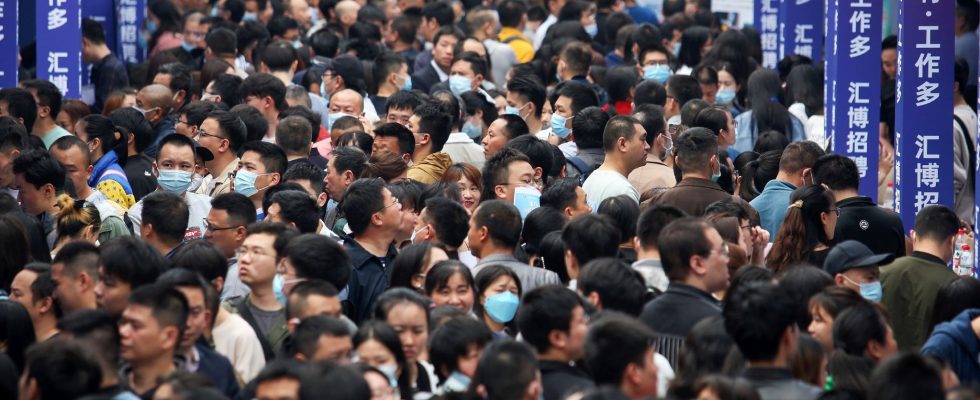Boost growth and try to stimulate activity. In order to reinvigorate its economy, China is counting on more loans to individuals and businesses: the central bank further lowered a benchmark rate on Monday, August 21.
The second largest economy in the world is seized up. Activity is notably penalized by sluggish consumption in a context of uncertainty on the labor market and the global economic slowdown which is weighing on demand for Chinese goods and therefore the activity of thousands of factories.
The situation in the real estate sector, with its share of developers on the verge of bankruptcy and unfinished housing, is also a major obstacle to growth. This sector, along with the construction sector, has long contributed a quarter of China’s GDP. Another sign of a slowdown: loans to households in July reached their lowest level since 2009.
In an attempt to stimulate activity, the Central Bank again reduced a key rate on Monday. The one-year LPR (loan prime rate, the preferential rate for a loan), which is the benchmark for the most advantageous rates that banks can offer to businesses and households, has been reduced from 3.55% to 3.45 %. This rate had already been lowered in June. The five-year benchmark for mortgages is unchanged at 4.2%. Highly followed by the markets, these two rates are at their historic lows.
The central bank had already reduced on Tuesday August 15 the rate for its medium-term loans to financial institutions (MLF).
“Confidence is the key to recovery”
The decision announced on Monday, anticipated by economists, is supposed to encourage commercial banks to grant more credit and at better rates. This measure should indirectly support activity in a context of economic slowdown. It runs counter to the major economies in the world raising rates to curb inflation.
Analysts polled by Bloomberg, however, expected a larger cut in the LPR and for both rates. “Confidence is the key to recovery,” said analyst Maggie Wei of US investment bank Goldman Sachs. “This reduction in the LPR is disappointing” and risks being counterproductive if the markets interpret this as Beijing’s “reluctance” to further stimulus measures, believes Maggie Wei.
Chinese stock markets were in any case down at midday. On Friday August 18, the Central Bank and financial regulators had however mentioned the need to “support” the economy further and reduce “hidden risks and dangers”, the official media reported on Sunday August 20, without specifying their nature.
The pressure is growing for a vast recovery plan
The long-awaited post-Covid recovery in China after the lifting of health restrictions at the end of 2022 has run out of steam in recent months. The setbacks of property developer Country Garden, long reputed to be financially sound and now ultra-indebted, raise fears of a bankruptcy with immeasurable consequences for the financial system in China, two years after the descent into hell of its competitor Evergrande.
The bad series of indicators, which have followed one another in recent weeks in China, are increasing the pressure for a vast recovery plan. But the power is reluctant to do so in order not to increase the debt.
The Chinese government, on the other hand, is multiplying benevolent announcements against the private sector, which was particularly hard hit during the health crisis, but also in favor of consumption, with tax deductions in particular. However, these measures have so far struggled to take effect, at a time when one in five young people is unemployed.
After a record level of youth unemployment recorded in June 2023, according to official data (21.3%), China is now suspending the monthly publication of detailed employment figures for 16-24 year olds.
The economic situation threatens the growth target set at around 5% for this year by the government. This rate would be one of the lowest in decades for the Asian giant outside the Covid period. China on Wednesday (August 16) acknowledged economic “difficulties” but castigated the pessimism of those in the West who doubt the Asian giant’s ability to support global growth. “The facts will prove them wrong,” said Wang Wenbin, a spokesman for the Chinese Ministry of Foreign Affairs.
